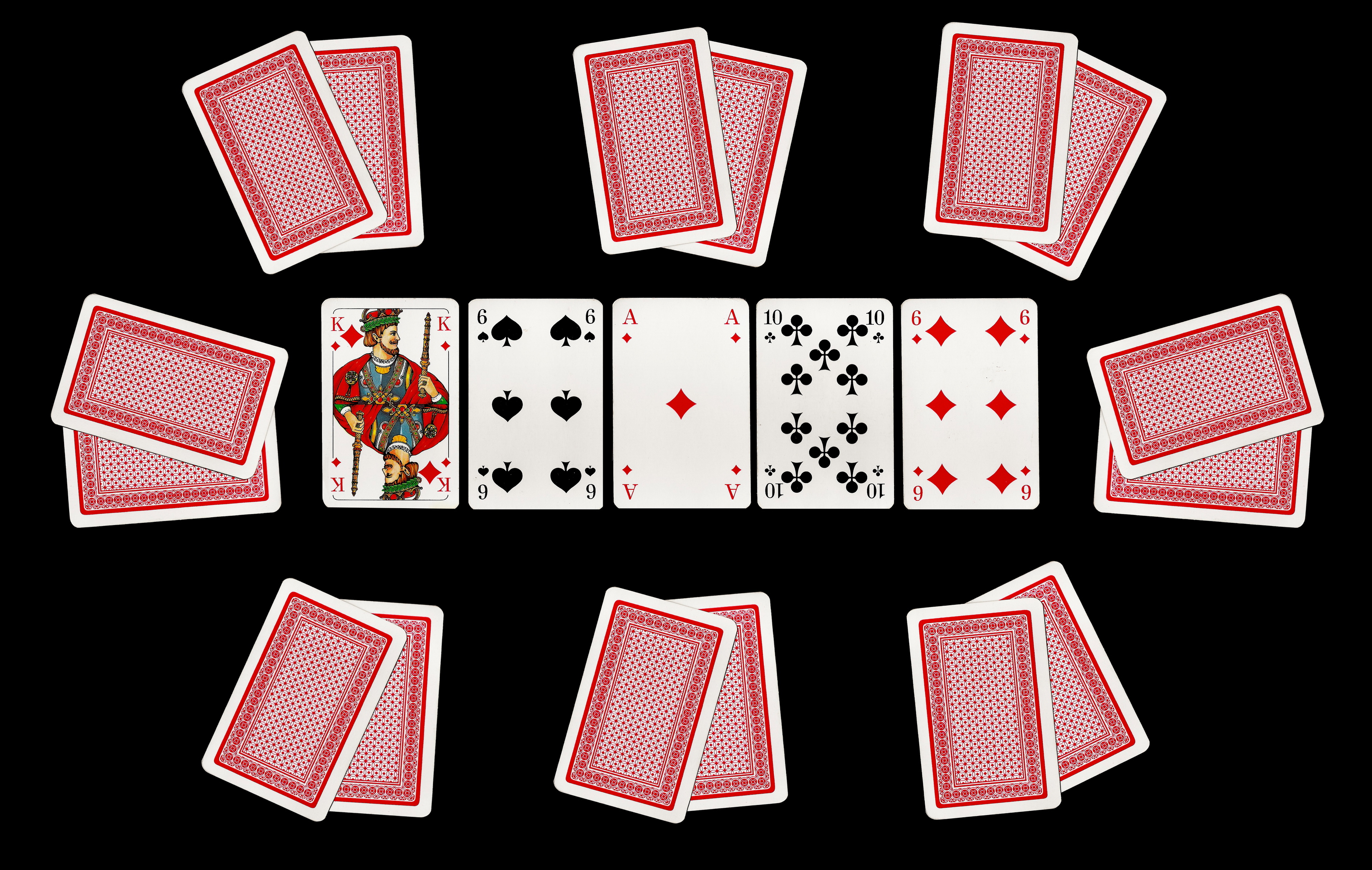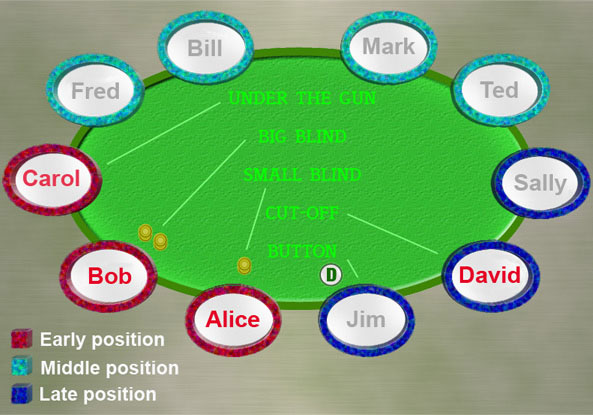|
Table Stakes
In poker and other gambling games, table stakes is a rule that a player may bet no more money than they had on the table at the beginning of that hand; they cannot go back to their pocket for more money once a hand is dealt. This limits the amount that a player can lose, while also limiting the amount other players may have to bet. In between hands, a player is free to re-buy or add on so long as their entire stack after the re-buy or add-on does not exceed the maximum buy-in. This rule generally applies to cash or ring games of poker rather than tournament games and is intended to level the stakes by creating a maximum and minimum buy-in as well as rules for adding and removing chips from play when playing with cash. A player also may not take a portion of their money off the table, unless they leave the game and take their entire stack out of play. Table stakes is the rule in most cash poker games because it allows players with vastly different bankrolls a reasonable amount ... [...More Info...] [...Related Items...] OR: [Wikipedia] [Google] [Baidu] |
Poker
Poker is a family of Card game#Comparing games, comparing card games in which Card player, players betting (poker), wager over which poker hand, hand is best according to that specific game's rules. It is played worldwide, with varying rules in different places. While the earliest known form of the game was played with just 20 cards, today it is usually played with a standard 52-card deck, although in countries where short packs are common, it may be played with 32, 40 or 48 cards.Parlett (2008), pp. 568–570. Thus poker games vary in deck configuration, the number of cards in play, the number Poker dealer, dealt face up or face down and the number Community card poker, shared by all players, but all have rules that involve one or more rounds of Betting in poker, betting. In most modern poker games, the first round of betting begins with one or more of the players making some form of a forced bet (the ''blind (poker), blind'' or ''ante''). In standard poker, each player bets a ... [...More Info...] [...Related Items...] OR: [Wikipedia] [Google] [Baidu] |
Gambling
Gambling (also known as betting or gaming) is the wagering of something of Value (economics), value ("the stakes") on a Event (probability theory), random event with the intent of winning something else of value, where instances of strategy (game theory), strategy are discounted. Gambling thus requires three elements to be present: consideration (an amount wagered), risk (chance), and a prize. The outcome of the wager is often immediate, such as a single roll of dice, a spin of a roulette wheel, or a horse crossing the finish line, but longer time frames are also common, allowing wagers on the outcome of a future sports contest or even an entire sports season. The term "gaming" in this context typically refers to instances in which the activity has been specifically permitted by law. The two words are not mutually exclusive; ''i.e.'', a "gaming" company offers (legal) "gambling" activities to the public and may be regulated by one of many gaming control boards, for example, the ... [...More Info...] [...Related Items...] OR: [Wikipedia] [Google] [Baidu] |
Poker Table
A poker table or card table is a table specifically designed for playing card games. Traditional card tables The card table arose around 1700 as card games became wildly popular in Europe. The manufacture of card tables as fine home furniture lasted to the middle of the 1800s. Card tables made in this era often had a folding top, which enabled them to serve as pier tables, console tables, or end tables when not in use. Styles ranged from simple to elaborate, with higher-end card tables featuring inlaid wood or stone, extensive delicate carvings, and expensive Wood veneer, veneers. Some even had indentations carved into the playing surface to hold Casino token, playing tokens, and slots around the rim which served as candle-holders. Semicircular (or "D" or "half-round") tables in diameter (when opened) were the most popular card table in both North America and Europe. Typical American card tables from the late colonial and early American periods feature simple, straight lines, a ... [...More Info...] [...Related Items...] OR: [Wikipedia] [Google] [Baidu] |
List Of Poker Hands
In poker, players form sets of five playing cards, called ''hands'', according to the rules of the game. Each hand has a rank, which is compared against the ranks of other hands participating in the showdown to decide who wins the pot. In high games, like Texas hold 'em and seven-card stud, the highest-ranking hands win. In low games, like razz, the lowest-ranking hands win. In high-low split games, both the highest-ranking ''and'' lowest-ranking hands win, though different rules are used to rank the high and low hands. Each hand belongs to a category determined by the patterns formed by its cards. A hand in a higher-ranking category always ranks higher than a hand in a lower-ranking category. A hand is ranked within its category using the ranks of its cards. Individual cards are ranked, from highest to lowest: A, K, Q, J, 10, 9, 8, 7, 6, 5, 4, 3 and 2. However, aces have the lowest rank under ace-to-five low or ace-to-six low rules, or under high rules as part of a fiv ... [...More Info...] [...Related Items...] OR: [Wikipedia] [Google] [Baidu] |
Buying In (poker)
In poker and gaming, "buying in" is the process of entering a tournament that requires an up-front payment. The size of the payment, otherwise known as the "buy in", determines the total winning prize pool and also contains a fee, otherwise known as the rake Rake may refer to: Common meanings * Rake (tool), a horticultural implement, a long-handled tool with tines * Rake (stock character), a man habituated to immoral conduct * Rake (poker), the commission taken by the house when hosting a poker game ..., that is paid to the house. References Poker terminology {{Poker-stub ... [...More Info...] [...Related Items...] OR: [Wikipedia] [Google] [Baidu] |
Cash Game
Cash games, also sometimes referred to as ring games or live action games, are poker games played with "real" Poker chip, chips and money at stake, often with no predetermined end time, with players able to enter and leave as they see fit. In contrast, a poker tournament is played with tournament chips worth nothing outside the tournament, with a definite end condition (usually, only one player left), and a specific roster of competitors. Rules Players may freely buy into or cash out of a cash game between hands.Kinds of games: Ring games vs. tournaments However, it is normally prohibited for a player to remove a portion of his or her chips from the table. This is known as "Poker jargon#going south, going south". [...More Info...] [...Related Items...] OR: [Wikipedia] [Google] [Baidu] |
Poker Tournament
A poker tournament is a tournament where players compete by playing poker. It can feature as few as two players playing on a single table (called a " heads-up" tournament), and as many as tens of thousands of players playing on thousands of tables. The winner of the tournament is usually the person who wins every poker chip in the game and the others are awarded places based on the time of their elimination. To facilitate this, in most tournaments, blinds rise over the duration of the tournament. Unlike in a ring game (or cash game), a player's chips in a tournament cannot be cashed out for money and serve only to determine the player's placing. Buy-ins and prizes To enter a typical tournament, a player pays a fixed ''buy-in'' and at the start of play is given a certain quantity of tournament poker chips. Commercial venues may also charge a separate fee, or withhold a small portion of the buy-in, as the cost of running the event. Tournament chips have only notional value; they ... [...More Info...] [...Related Items...] OR: [Wikipedia] [Google] [Baidu] |
Cinema Of The United States
The cinema of the United States, primarily associated with major film studios collectively referred to as Hollywood, has significantly influenced the global film industry since the early 20th century. Classical Hollywood cinema, a filmmaking style developed in the 1910s, continues to shape many American films today. While French filmmakers Auguste and Louis Lumière are often credited with modern cinema's origins, American filmmaking quickly rose to global dominance. As of 2017, more than 600 English-language films were released annually in the U.S., making it the fourth-largest producer of films, trailing only India, Japan, and China. Although the United Kingdom, Canada, Australia, and New Zealand also produce English-language films, they are not directly part of the Hollywood system. Due to this global reach, Hollywood is frequently regarded as a transnational cinema with some films released in multiple language versions, such as Spanish and French. Contemporary Hollyw ... [...More Info...] [...Related Items...] OR: [Wikipedia] [Google] [Baidu] |
Business
Business is the practice of making one's living or making money by producing or Trade, buying and selling Product (business), products (such as goods and Service (economics), services). It is also "any activity or enterprise entered into for profit." A business entity is not necessarily separate from the owner and the creditors can hold the owner liable for debts the business has acquired except for limited liability company. The taxation system for businesses is different from that of the corporates. A business structure does not allow for corporate tax rates. The proprietor is personally taxed on all income from the business. A distinction is made in law and public offices between the term business and a company (such as a corporation or cooperative). Colloquially, the terms are used interchangeably. Corporations are distinct from Sole proprietorship, sole proprietors and partnerships. Corporations are separate and unique Legal person, legal entities from their shareholde ... [...More Info...] [...Related Items...] OR: [Wikipedia] [Google] [Baidu] |
Product Differentiation
In economics and marketing, product differentiation (or simply differentiation) is the process of distinguishing a product or service from others to make it more attractive to a particular target market. This involves differentiating it from competitors' products as well as from a firm's other products. The concept was proposed by Edward Chamberlin in his 1933 book, '' The Theory of Monopolistic Competition''. Rationale Firms have different resource endowments that enable them to construct specific competitive advantages over competitors. Resource endowments allow firms to be different, which reduces competition and makes it possible to reach new segments of the market. Thus, differentiation is the process of distinguishing the differences of a product or offering from others, to make it more attractive to a particular target market. Although research in a niche market may result in changing a product in order to improve differentiation, the changes themselves are not ... [...More Info...] [...Related Items...] OR: [Wikipedia] [Google] [Baidu] |
Betting In Poker
In the game of poker, the play largely centers on the act of betting, and as such, a protocol has been developed to speed up play, lessen confusion, and increase security while playing. Different games are played using different types of bets, and small variations in etiquette exist between cardrooms, but for the most part the following rules and protocol are observed by the majority of poker players. Procedure Players in a poker game act in turn, in clockwise rotation (acting out of turn can negatively affect other players). When it is a player's turn to act, the first verbal declaration or action they take binds them to their choice of action; this rule prevents a player from changing their action after seeing how other players react to their initial action. Until the first bet is made each player in turn may "check", which is to not place a bet, or "open", which is to make the first bet. After the first bet each player may "fold", which is to drop out of the hand losing an ... [...More Info...] [...Related Items...] OR: [Wikipedia] [Google] [Baidu] |
Glossary Of Poker Terms
The following is a glossary of poker terms used in the card game of poker. It supplements the glossary of card game terms. Besides the terms listed here, there are thousands of common and uncommon poker slang terms. This is not intended to be a formal dictionary; precise usage details and multiple closely related senses are omitted here in favor of concise treatment of the basics. A ; ace in the hole : One of the hole cards is an ace ; ace-to-five, ace-to-six : Methods of evaluating low hands. See lowball. ; act : To make a play (check, bet, call, raise, or fold) at the required time, compare to '' in turn''. ; acting out of turn : A player in poker that either announces their actions or physically plays before their turn (checks, folds etc.). Sometimes players act out of turn intentionally to get a read out of other players. When done intentionally, this is often referred to as "angle shooting." See angle shooting. ; action : A player's turn to act; a willingness to ... [...More Info...] [...Related Items...] OR: [Wikipedia] [Google] [Baidu] |








